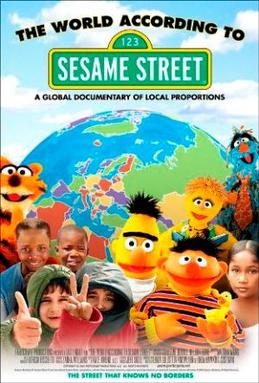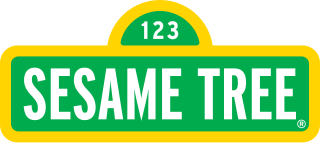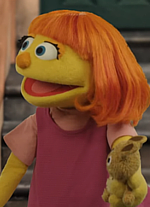
Sesame Street is an American educational children's television series that combines live-action, sketch comedy, animation and puppetry. It is produced by Sesame Workshop and was created by Joan Ganz Cooney and Lloyd Morrisett. It is known for its images communicated through the use of Jim Henson's Muppets, and includes short films, with humor and cultural references. It premiered on November 10, 1969, to positive reviews, some controversy, and high viewership. It has aired on the United States national public television provider PBS since its debut, with its first run moving to premium channel HBO on January 16, 2016, then its sister streaming service HBO Max in 2020. Sesame Street is one of the longest-running shows in the world.

Sesame Workshop, Inc. (SW), originally known as the Children's Television Workshop, Inc. (CTW), is an American nonprofit organization that has been responsible for the production of several educational children's programs—including its first and best-known, Sesame Street—that have been televised internationally. Television producer Joan Ganz Cooney and foundation executive Lloyd Morrisett developed the idea to form an organization to produce Sesame Street, a television series which would help children, especially those from low-income families, prepare for school. They spent two years, from 1966 to 1968, researching, developing, and raising money for the new series. Cooney was named as the Workshop's first executive director, which was termed "one of the most important television developments of the decade."

Elmo Monster is a red Muppet character on the children's television show Sesame Street. A furry red monster who speaks in a high-pitched falsetto voice and frequently refers to himself in the third person, he hosts the last full five-minute segment on Sesame Street, "Elmo's World", which is aimed at toddlers. He was most often puppeteered by Kevin Clash, but since his resignation in late 2012, he has been puppeteered by Ryan Dillon.

The preschool educational television program Sesame Street was first aired on public television stations on November 10, 1969, and reached its 54th season in 2023. The history of Sesame Street has reflected changing attitudes to developmental psychology, early childhood education, and cultural diversity. Featuring Jim Henson's Muppets, animation, live shorts, humor and celebrity appearances, it was the first television program of its kind to base its content and production values on laboratory and formative research, and the first to include a curriculum "detailed or stated in terms of measurable outcomes". Initial responses to the show included adulatory reviews, some controversy and high ratings. By its 40th anniversary in 2009, Sesame Street was broadcast in over 120 countries, and 20 independent international versions had been produced. It has won eleven Grammys and over 150 Emmys in its history—more than any other children's show.

Plaza Sésamo is one of the first international co-productions of the first preschool television program Sesame Street. Its first season premiered in Mexico in 1972, and the last season ended in 2018 during the holiday season and the 50th anniversary of Sesame Street, but the show returned in 2020 and was immediately a ratings hit. It also aired throughout Latin America, to a potential audience of 25 million children in 34 countries. Unlike some of the earliest co-productions, which consisted of dubbed versions of Sesame Street with local language voice-overs, Plaza Sésamo was a true co-production. Half of the show was adapted from the American show, and half was original material, created in Mexico by Mexican writers, performers, and producers. The first season consisted of 130 half-hour episodes. The Plaza Sésamo development process was similar to that of the American show. Its goals were developed by local experts in television, child development, and early education during curriculum seminars in Caracas, Venezuela. Sésamo's goals emphasized problem solving and reasoning, and also included perception, symbolic representation, human diversity, and the child's environment. Other goals included community cooperation, family life, nutrition, health, safety, self-esteem, and expressing emotions. Early reading skills were taught through the whole language method. The show's budget for the first and second seasons was approximately US$1.6 million.

Takalani Sesame is the South African co-production of the children's television program Sesame Street, co-produced by Sesame Workshop and South African partners. The series debuted in 2000 and currently airs on SABC 2.
Kami are beings venerated in the Japanese Shinto tradition.
Baghch-e-Simsim is a Dari- and Pashto-language co-production based on the American children's television series Sesame Street. The series launched in Afghanistan in December 2011, and has aired on TOLO and Lemar.

The World According to Sesame Street is a 2006 documentary film created by Participant Productions, looking at the cultural impact of the children's television series Sesame Street, and the complexities of creating international adaptations. It focuses on the adaptations of Sesame Street in Bangladesh (Sisimpur), Kosovo, and South Africa. The film premiered at the 2006 Sundance Film Festival in the documentary competition.

Noel MacNeal, sometimes credited as Noel McNeal or Edward Noel MacNeal, is an American puppeteer, actor, director and writer of children's television who has performed since the early 1980s. He was the voice and puppeteer of Bear on Bear in the Big Blue House. He also starred as Kako on Oobi, Leon MacNeal on The Puzzle Place and as Magellan on Eureeka's Castle. He is also the resident puppeteer for Last Week Tonight with John Oliver, portraying puppet characters such as "Mr. Nutterbutter".
Sesame Street international co-productions are adaptations of the American educational children's television series Sesame Street but tailored to the countries in which they are produced. Shortly after the debut of Sesame Street in the United States in 1969, television producers, teachers, and officials of several countries approached the show's producers and the executives of the Children's Television Workshop (CTW), renamed Sesame Workshop (SW) in 2000, about the possibility of airing international versions of Sesame Street. Creator Joan Ganz Cooney hired former CBS executive Michael Dann to field offers to produce versions of the show in other countries.

Sesame Tree was an adaptation of the American children's television series, Sesame Street, which was made entirely in Northern Ireland. The series was produced by Belfast based production company, Sixteen South and Sesame Workshop. The first episode aired on BBC Two in Northern Ireland on 5 April 2008, with the first series subsequently airing nationwide on CBeebies in August 2008.

HIV/AIDS in Nigeria was a concern in the 2000s, when an estimated seven million people had HIV/AIDS. In 2008, the HIV prevalence rate among adults aged between 15 and 49 was 3.9 percent, in 2018 the rate among adults aged between 15 and 65 was 1.5 percent. As elsewhere in Africa, women are statistically more likely to have HIV/AIDS. The Nigeria HIV/AIDS Indicator and Impact Survey was the world's largest and presented statistics which showed the overall numbers were lower than expected. Antiretroviral treatment is available, but people prefer to take the therapy secretly, since there is still noticeable discrimination against people with HIV/AIDS.
Sesame Square is the Nigerian version of Sesame Street. It launched in 2011 as West Africa's first Sesame Street adaptation. Nigerians produce and voice the series in Standard English. It airs on the Nigerian Television Authority network.
The children's television program Sesame Street premiered in 1969 to high ratings, positive reviews, and some controversy, which have continued during its history. Even though the show aired on only 67% of American televisions at the time of its premiere, it earned a 3.3 Nielsen rating, or 1.9 million households. By its tenth anniversary in 1979, 9 million American children under the age of six were watching Sesame Street daily. Its ratings declined in the 1990s, due to societal changes. A survey conducted in 1996 found that by the age of three, 95% of all American children had watched it. By its fortieth anniversary in 2009, it was ranked the fifteenth most popular children's show.

SimSim Humara, also known as Sim Sim Hamara; meaning Our Sim Sim) is the Pakistani version of the children's television series Sesame Street. It is produced by Pakistan Children's Television and Rafi Peer Theatre.
The virgin cleansing myth is the belief that having sex with a virgin girl cures a man of HIV/AIDS or other sexually transmitted diseases. Helping the idea that Christian women who were virgins, were capable of being powerful enough to fight off transmitted diseases.
Kilimani Sesame is the Tanzanian version of Sesame Street. The show airs on Tanzania Broadcasting Corporation (TBC) and Television Zanzibar (TVZ). The production was launched in April 2008. The United States Agency for International Development (USAID) sponsored the production.

Julia is a fictional character on the PBS/HBO children's educational television series Sesame Street. She is known for being the first Sesame Street character diagnosed with autism. Julia is a friendly four-year-old girl who enjoys bonding with her supportive family and her friends on Sesame Street. She first appeared in 2015 in an online autism awareness initiative from Sesame Workshop, entitled Sesame Street and Autism: See Amazing in All Children. Julia later made her first appearance on television series on Episode 4715, which originally aired on April 2, 2017.











